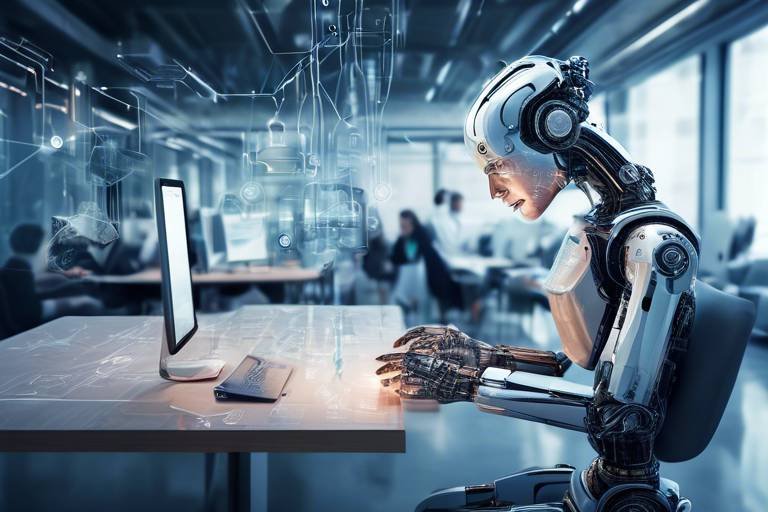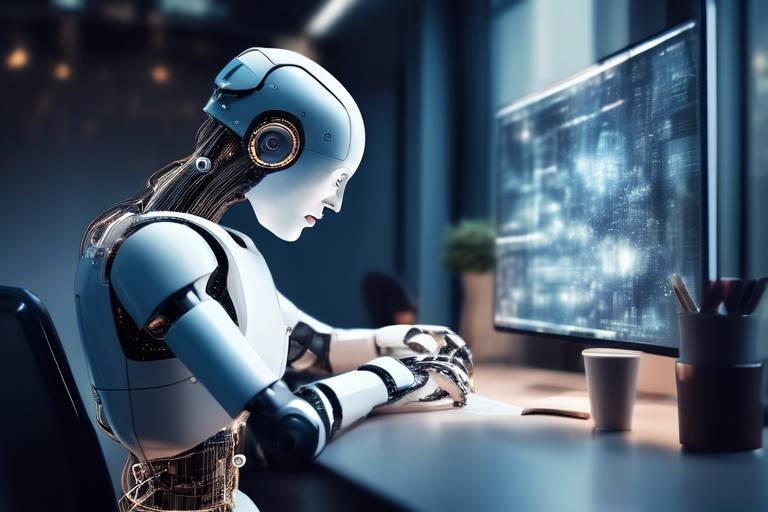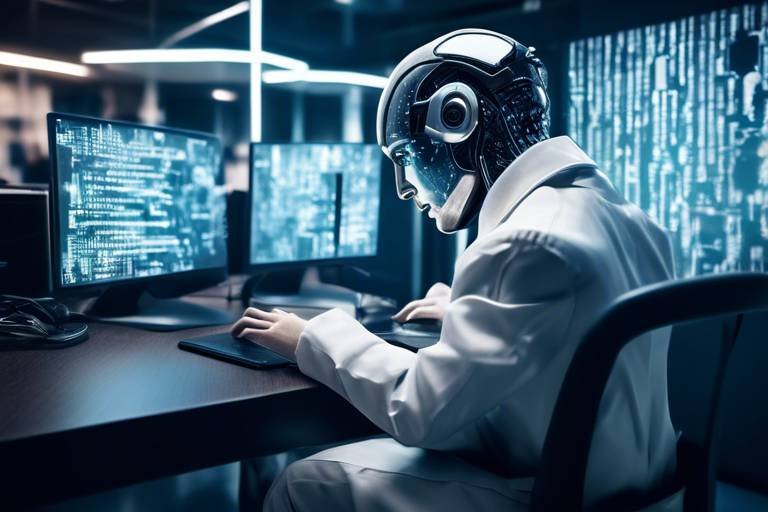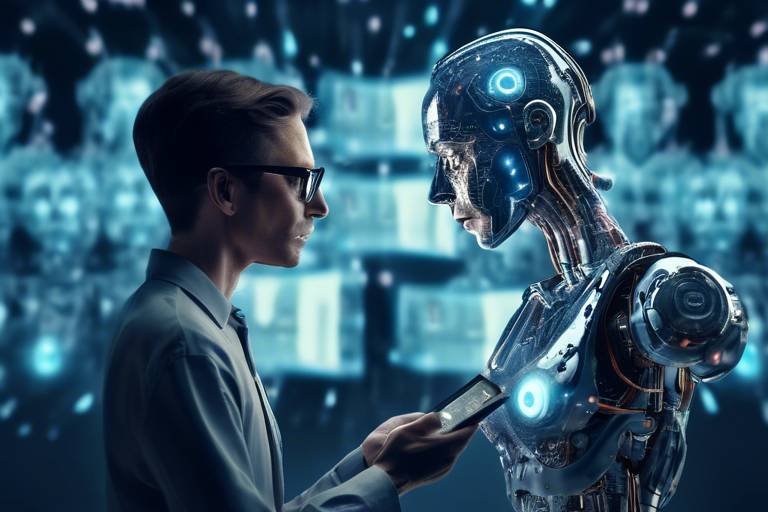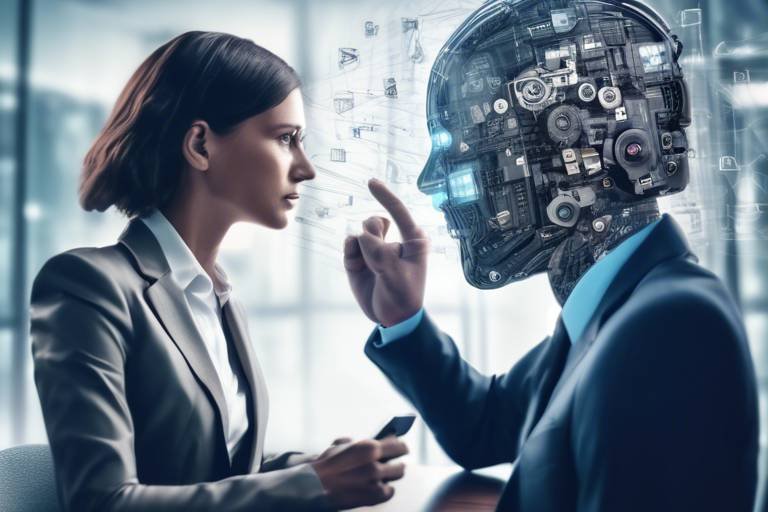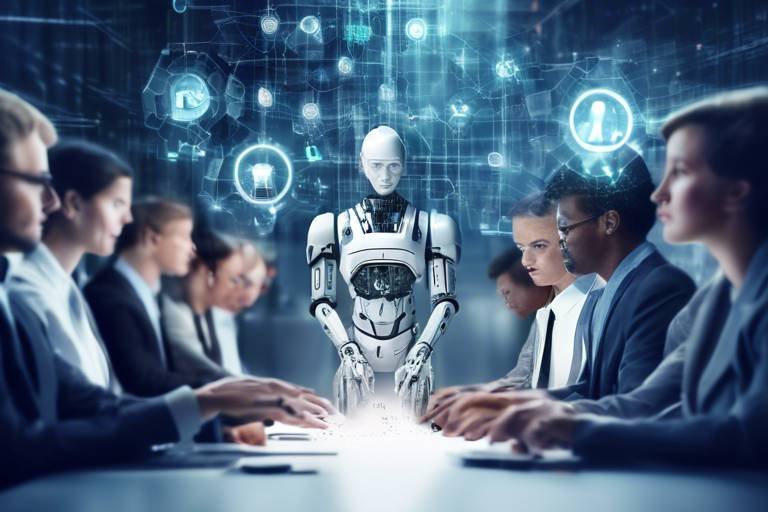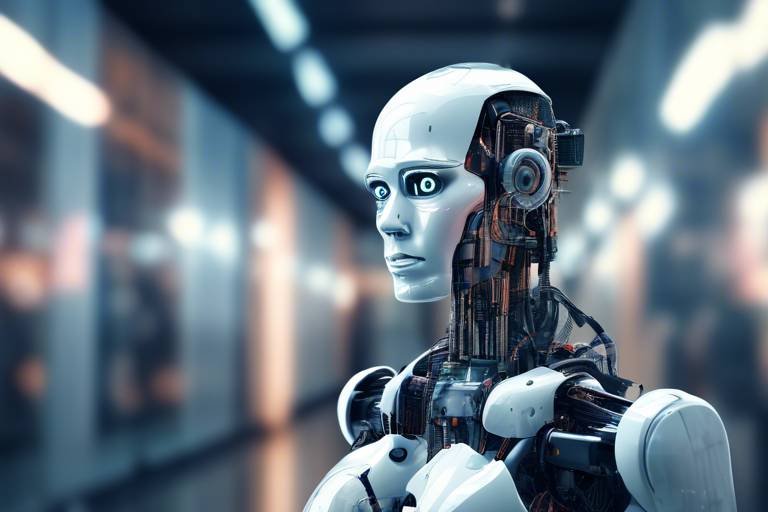Fear of AI in the Future Workforce: Debunking the Myths
As we stand on the brink of a technological revolution, the fear of artificial intelligence (AI) infiltrating our workplaces has become a hot topic. Many people are concerned about what AI means for their jobs and the future of work as we know it. Are we really heading toward a dystopian future where machines rule the roost? Or is there a silver lining to this cloud of uncertainty? This article dives into the common fears surrounding AI's impact on employment, addressing misconceptions and highlighting the potential benefits of AI integration in the workforce.
AI technology is not just a buzzword; it’s rapidly advancing and becoming integrated into various industries. From healthcare to finance, AI is revolutionizing the way we work. But understanding its role can help alleviate fears and clarify its potential impact on job markets and employee roles. Imagine AI as a helpful assistant, working alongside humans to enhance productivity rather than replace them. This paradigm shift can lead to a more efficient and innovative workplace.
With the rise of AI comes a slew of myths that contribute to the fear of job loss. One of the most pervasive myths is that AI will replace all jobs. But let's take a step back and examine the reality of job displacement versus job transformation in the age of AI. While it’s true that some roles may become obsolete, many others will evolve, requiring new skills and adaptability.
This fear is widespread, but the truth is more nuanced. AI is designed to handle repetitive tasks, which allows humans to focus on more complex and creative aspects of their jobs. For example, consider how AI can streamline data analysis in marketing, freeing up professionals to brainstorm innovative campaigns. Instead of fearing job loss, we should embrace the potential for job transformation.
While AI is powerful, there are certain professions that require human creativity, empathy, and complex problem-solving skills that AI cannot replicate. These roles are likely to remain secure despite AI advancements. Professions in the arts, healthcare, and education, for instance, thrive on human interaction and emotional intelligence. Here are some examples:
- Healthcare Professionals: Doctors and nurses provide care that requires empathy and human touch.
- Creative Roles: Artists, writers, and designers rely on human creativity and emotional connection.
- Teachers: Educators foster relationships and adapt to the needs of their students in ways AI cannot.
Rather than viewing AI as a threat, we should consider it as a job enhancer. By automating repetitive tasks, AI can lead to increased productivity and job satisfaction for workers. Imagine a world where mundane tasks are taken off your plate, allowing you to focus on what you do best. This can lead to a happier, more engaged workforce, ultimately benefiting both employees and employers.
As AI evolves, so do the skills needed in the workforce. The future will require a blend of technical skills and soft skills. Workers will need to adapt by learning how to work alongside AI tools. Skills such as critical thinking, emotional intelligence, and adaptability will become more valuable than ever. Embracing lifelong learning will be crucial in this new landscape.
While fears often focus on job loss, it’s essential to recognize that AI also creates new opportunities. The emergence of AI technology can lead to the creation of new industries and job roles that we can’t even imagine yet. For instance, as AI continues to develop, roles in AI ethics, data analysis, and machine learning will become increasingly important.
AI is generating demand for new professions. Industries such as healthcare, finance, and technology are expanding due to AI advancements. Here are some exciting career paths that are emerging:
- AI Ethics Consultant: As AI technologies become more prevalent, ethical considerations will be paramount.
- Data Scientist: Professionals who can analyze and interpret complex data will be in high demand.
- AI Trainers: These individuals will be responsible for teaching AI systems how to perform tasks effectively.
To thrive alongside AI, workers must adapt. Companies and educational institutions are increasingly focusing on reskilling and upskilling initiatives to prepare the workforce for future challenges and opportunities. Investing in education and training programs will empower employees to embrace the changes brought about by AI, ensuring that they remain relevant in the job market.
Q: Will AI really take away my job?
A: While AI may change certain job roles, it is more likely to enhance jobs rather than eliminate them entirely.
Q: What skills should I focus on developing for the future?
A: Emphasize critical thinking, emotional intelligence, and technical skills related to AI and data analysis.
Q: How can I prepare for a future with AI?
A: Engage in lifelong learning, seek out training opportunities, and stay informed about technological advancements in your field.

The Rise of AI in the Workplace
As we step into the future, the integration of Artificial Intelligence (AI) into the workplace is not just a trend—it's a revolution. AI technology is rapidly advancing, transforming how we work across various industries. Imagine a world where mundane tasks are automated, allowing employees to focus on more strategic and creative endeavors. This isn't science fiction; it's the reality we're beginning to experience. Understanding AI's role in this transformation can help alleviate fears and clarify its potential impact on job markets and employee roles.
AI is not merely a tool; it is becoming a vital partner in enhancing productivity and efficiency. From healthcare to finance, and even education, AI systems are being employed to analyze vast amounts of data, streamline operations, and provide insights that were previously unimaginable. For instance, in the healthcare industry, AI algorithms can detect patterns in medical data that help doctors make better diagnoses. In finance, AI can predict market trends, allowing companies to make informed decisions rapidly. This level of efficiency can lead to significant improvements in service delivery and customer satisfaction.
However, the rise of AI isn't just about replacing existing processes; it's about creating new opportunities. With AI's ability to handle repetitive tasks, employees can shift their focus toward more complex and meaningful work. This shift can lead to increased job satisfaction and a more engaged workforce. Think of it this way: if AI is the engine, then human creativity and emotional intelligence are the steering wheel. Together, they can drive innovation and growth.
Moreover, the integration of AI into the workplace is paving the way for entirely new industries and job roles. As companies adopt AI technologies, they will need skilled individuals to manage, maintain, and improve these systems. This demand for talent highlights the importance of continuous learning and adaptation in the workforce. As we embrace this change, we must also consider how we can prepare ourselves and future generations for a world where AI plays a central role.
In summary, the rise of AI in the workplace represents a significant shift in how we approach work. Rather than viewing AI as a threat, we should see it as a powerful ally that can enhance our abilities and open up new horizons. By understanding and embracing this technology, we can position ourselves for success in an ever-evolving job market.
- What is AI? AI, or Artificial Intelligence, refers to the simulation of human intelligence in machines designed to think and act like humans.
- Will AI take away all jobs? While AI may automate certain tasks, it will also create new job opportunities and enhance existing roles.
- What skills will be important in the future workforce? Skills such as critical thinking, creativity, and emotional intelligence will be essential as AI continues to evolve.
- How can I prepare for a future with AI? Continuous learning, reskilling, and upskilling are vital to thrive alongside AI technologies.

Common Myths About AI and Employment
The rise of artificial intelligence (AI) in the workplace has sparked numerous debates and discussions, but unfortunately, it has also given birth to a plethora of myths that contribute to widespread fear regarding job security. Many people believe that AI is a relentless force set to obliterate jobs across all sectors, but this perspective is both simplistic and misleading. In reality, the relationship between AI and employment is far more nuanced. By debunking these common myths, we can foster a better understanding of AI's actual capabilities and limitations.
One of the most pervasive myths is the notion that AI will replace all jobs. This belief stems from the rapid advancements in AI technology, which can automate tasks that were once thought to require human intelligence. However, the truth is that while AI may displace certain roles, it is equally likely to transform existing jobs rather than eliminate them entirely. For instance, consider the role of a customer service representative. AI can take over routine inquiries, allowing human agents to focus on more complex customer issues that require empathy and nuanced understanding. This transition highlights a crucial point: AI is not merely a job destroyer; it can also be a powerful tool for job transformation.
Moreover, jobs that require human creativity, empathy, and complex problem-solving skills are less likely to be replaced by AI. Professions such as artists, therapists, and strategic planners rely on uniquely human attributes that AI cannot replicate. For example, a therapist's ability to connect with a client on an emotional level is something that AI simply cannot achieve. The essence of these roles lies in human interaction, creativity, and emotional intelligence, which remain irreplaceable even in a technologically advanced world.
Another common misconception is that AI leads to a decrease in job satisfaction. On the contrary, AI can serve as a job enhancer. By automating repetitive and mundane tasks, AI allows employees to engage in more meaningful work that fosters creativity and innovation. Imagine a factory worker who spends hours performing the same task. With AI taking over this repetitive work, that employee can shift focus to quality control or process improvement, leading to a more fulfilling job experience. This shift not only increases productivity but also enhances job satisfaction, as workers feel more engaged in their roles.
Furthermore, it's essential to recognize that AI is not a monolithic entity; it is a tool that can be tailored to meet the needs of various industries. For instance, in healthcare, AI can assist doctors in diagnosing diseases more accurately, but it cannot replace the compassionate care that a human doctor provides. This collaboration between AI and human workers can lead to better outcomes for patients and a more efficient healthcare system overall.
As we navigate the complexities of AI in the workforce, it is vital to address these myths head-on. Understanding that AI is not an enemy but rather an ally can help alleviate fears and encourage a more optimistic view of the future. The key lies in adaptation and collaboration, where humans and AI can work together to create a more dynamic and innovative workplace.
In summary, while it’s easy to succumb to the fear that AI will take over jobs, it’s important to remember that this technology is here to enhance our capabilities rather than replace them. By debunking these myths, we can pave the way for a future where AI and humans coexist and thrive together.
- Will AI take my job? - While AI may change the nature of some jobs, it is more likely to transform roles than eliminate them entirely.
- What jobs are safe from AI? - Jobs that require emotional intelligence, creativity, and complex decision-making are less likely to be replaced by AI.
- How can I prepare for a future with AI? - Focus on developing skills that complement AI, such as critical thinking, creativity, and emotional intelligence.

AI Will Replace All Jobs
The fear that is a prevalent notion that has sparked countless debates and discussions. It's almost as if we are standing at the edge of a cliff, peering into the unknown, and fearing that the ground will crumble beneath us. But let’s take a step back and examine this fear more closely. While it's true that AI is transforming the workforce, the reality is far more nuanced than the doomsday predictions suggest.
First and foremost, it’s essential to understand that AI is not a monolithic entity; it is a collection of technologies designed to perform specific tasks. Think of AI as a powerful tool, much like a calculator that can perform complex mathematical operations faster than a human. Just as calculators didn't replace mathematicians, AI won't replace every job either. Instead, it will change how we work, leading to a transformation rather than outright elimination.
In fact, many jobs will evolve rather than disappear. For example, consider the role of a customer service representative. With AI-powered chatbots handling routine inquiries, representatives can focus on more complex issues that require human empathy and understanding. This shift not only enhances job satisfaction but also allows employees to engage in more meaningful work.
Moreover, it's crucial to recognize that some professions are inherently resistant to automation. Jobs that require creativity, emotional intelligence, and complex problem-solving skills are less likely to be replaced by AI. For instance, artists, therapists, and strategic planners utilize uniquely human qualities that AI simply cannot replicate. As we delve deeper into this topic, it becomes clear that the narrative of AI as a job destroyer is oversimplified.
To illustrate this point, let’s consider a few examples of jobs that AI cannot easily replace:
- Healthcare Professionals: Doctors and nurses require a deep understanding of human emotions and the ability to make nuanced decisions based on patient interactions.
- Creative Roles: Writers, designers, and artists depend on human experiences and emotions to create work that resonates with people.
- Educators: Teachers not only impart knowledge but also inspire and mentor students, a role that involves empathy and personal connection.
As we navigate this evolving landscape, it's vital to embrace the idea that AI can be a collaborative partner rather than a competitor. By automating mundane tasks, AI can free up human workers to focus on more strategic and creative aspects of their jobs. This collaboration can lead to increased productivity and innovation, ultimately benefiting both employees and employers.
In summary, while the fear that AI will replace all jobs is understandable, it is not entirely accurate. Instead of viewing AI as a threat, we should recognize it as an opportunity for growth and transformation. As we adapt to these changes, the workforce will likely see a shift towards more fulfilling roles that leverage the unique capabilities of both humans and machines.

Jobs That AI Cannot Replace
The notion that AI will take over every job is a common fear, but the reality is much more nuanced. While AI can perform numerous tasks with remarkable efficiency, there are certain professions that require distinctly human traits—traits that AI simply cannot replicate. For instance, jobs that demand creativity, empathy, and complex problem-solving skills will remain secure in the hands of humans. Think about artists, therapists, and educators; these roles thrive on human connection and emotional intelligence, which are areas where AI falls short.
Consider the role of a psychologist. This profession requires deep understanding, empathy, and the ability to connect on a personal level with clients. While AI can analyze data and even simulate conversations, it lacks the human touch necessary for effective therapy. Similarly, in the realm of education, teachers play a vital role in inspiring and mentoring students, fostering critical thinking, and nurturing creativity. AI can assist in delivering information, but it cannot replace the mentorship and emotional support that a teacher provides.
Moreover, jobs in fields such as healthcare are irreplaceable due to the need for human compassion and ethical decision-making. Surgeons and nurses, for instance, not only apply technical skills but also need to offer comfort and reassurance to patients, especially in high-stress situations. In these scenarios, the human touch is irreplaceable, as patients often seek more than just medical expertise; they crave understanding and empathy.
Furthermore, professions that involve strategic decision-making and leadership will also remain secure. Business leaders must navigate complex social dynamics, inspire teams, and make decisions that consider the broader impact on society and the environment. AI can provide data-driven insights, but the ultimate decision-making often requires a human perspective that considers ethics, values, and long-term implications.
In summary, while AI is transforming many industries, it is essential to recognize that it cannot replace jobs that rely heavily on human qualities. As we integrate AI into the workforce, it is crucial to focus on enhancing human capabilities rather than fearing job loss. Embracing the unique attributes that make us human will ensure that we continue to thrive alongside AI.
- Will AI really take over my job? - Not necessarily. While AI may automate certain tasks, many jobs require human skills that AI cannot replicate.
- What types of jobs are safe from AI? - Jobs in healthcare, education, and creative fields are typically safe due to their reliance on human empathy and complex decision-making.
- How can I prepare for the future workforce? - Focus on developing soft skills, such as communication, creativity, and emotional intelligence, which are crucial in an AI-enhanced workplace.

AI as a Job Enhancer
When we think about AI, it's easy to picture a cold, metallic entity taking over our jobs, right? But hold on a second! The reality is far more nuanced and, dare I say, exciting. Rather than just a job snatcher, AI can actually be a job enhancer. Imagine having a reliable assistant that takes care of the mundane tasks, allowing you to focus on what you do best! This synergy between humans and AI can lead to increased productivity and job satisfaction.
Let's break it down a bit. AI excels at automating repetitive and time-consuming tasks. For instance, in industries like finance, AI algorithms can process vast amounts of data in seconds, identifying patterns and anomalies that would take humans hours or even days to uncover. This not only speeds up the workflow but also reduces the chances of human error. Can you think of a more efficient way to handle data than having AI do the heavy lifting? It’s like having a super-powered calculator at your disposal!
Moreover, AI can assist in decision-making processes. Think about it: with AI analyzing trends and providing insights, employees can make more informed choices, leading to better outcomes for their teams and organizations. For example, in marketing, AI tools can analyze consumer behavior and suggest personalized strategies, allowing marketers to connect with their audience on a deeper level. This kind of collaboration transforms the workplace into a hub of creativity and innovation.
But it doesn’t stop there! AI also plays a crucial role in enhancing customer service. Chatbots, powered by AI, can handle customer inquiries 24/7, providing instant responses and freeing up human agents to tackle more complex issues that require a personal touch. This not only improves the customer experience but also empowers employees to engage in more meaningful interactions. Imagine being able to spend more time solving intricate problems rather than answering the same FAQs over and over again!
In essence, AI is not here to replace us; it’s here to augment our capabilities. The future of work is not about humans versus machines; it’s about humans and machines working together. As we embrace this partnership, we must recognize that adapting to AI technologies can lead to a more fulfilling work environment. So, rather than fearing the rise of AI, let’s welcome it as a powerful tool that can help us unleash our full potential!
- Will AI take away my job?
No, AI is more likely to enhance your job by automating repetitive tasks, allowing you to focus on more complex and rewarding aspects of your work.
- What types of jobs are least likely to be affected by AI?
Jobs that require creativity, emotional intelligence, and complex problem-solving skills are less likely to be replaced by AI.
- How can I prepare for a future with AI in the workforce?
Embrace lifelong learning! Focus on developing skills that complement AI, such as critical thinking, creativity, and emotional intelligence.

The Skills of the Future
As we venture deeper into the era of artificial intelligence, the landscape of required skills is undergoing a dramatic transformation. Gone are the days when a static skill set would suffice to secure a job for life. Instead, the future workforce will demand a dynamic blend of technical prowess, soft skills, and adaptability. But what exactly does this mean for you, the worker of tomorrow? Let’s break it down.
First off, let's talk about technical skills. As AI continues to permeate various sectors, understanding how to work alongside these technologies will be crucial. This doesn’t mean you have to become a coding whiz overnight, but familiarity with data analysis, machine learning basics, and even understanding AI ethics will put you ahead of the curve. For instance, roles in data science, AI training, and even AI ethics compliance are on the rise, all requiring a solid foundation in technical know-how.
However, it’s not just about the hard skills. Soft skills are becoming increasingly vital in a world where machines handle the mundane. Skills such as emotional intelligence, creativity, and complex problem-solving will set you apart. Think about it: while AI can analyze data and generate reports, it can’t replicate the human touch required for effective teamwork or innovative thinking. Employers are looking for individuals who can collaborate with AI tools and also bring that unique human insight to the table.
Moreover, adaptability is key. The rapid pace of technological change means that the ability to learn new skills quickly and pivot when necessary will be invaluable. Imagine a world where you’re not just a cog in the machine, but a versatile player who can switch roles as the market demands. This level of flexibility is crucial in industries that are constantly evolving due to AI advancements.
To illustrate how these skills come together, let’s take a look at the following table that outlines some of the essential skills for the future workforce:
| Skill Type | Examples | Importance |
|---|---|---|
| Technical Skills | Data Analysis, Machine Learning, AI Ethics | Understanding AI technologies and their applications |
| Soft Skills | Emotional Intelligence, Creativity, Problem Solving | Enhancing collaboration and innovation in the workplace |
| Adaptability | Learning New Technologies, Flexibility in Roles | Staying relevant in a rapidly changing job market |
In essence, the skills of the future are not just a checklist of competencies but a holistic approach to personal and professional development. Workers must embrace lifelong learning and be ready to pivot as new technologies emerge. The intersection of AI and human skills promises to create a workforce that is not only efficient but also enriched by the unique qualities that only humans possess.
- What are the most important skills for the future workforce?
Technical skills like data analysis, soft skills such as emotional intelligence, and adaptability are crucial. - How can I improve my technical skills?
Consider online courses, workshops, and certifications in relevant fields. - Why are soft skills becoming more important?
As AI takes over repetitive tasks, human-centric skills will be essential for collaboration and innovation. - What does adaptability mean in the context of AI?
It refers to the ability to learn new skills quickly and adjust to changing job roles as technology evolves.

The Positive Impact of AI on Job Creation
While the conversation around AI often centers on the fear of job loss, it’s crucial to shift our perspective and recognize the positive impact AI can have on job creation. In fact, as AI technology continues to evolve, it opens up a whole new world of opportunities for employment. Just like the industrial revolution gave rise to new professions that didn’t exist before, AI is doing the same today. It’s not just about machines taking over; it’s about how these machines can work alongside humans to create a more efficient and innovative workforce.
One of the most exciting aspects of AI is its ability to drive the emergence of entirely new industries. For instance, the rise of AI has led to the development of sectors focused on machine learning, data analysis, and AI ethics. These fields require a workforce skilled in technology and critical thinking. Consider the following table that illustrates some of the new job roles that have emerged due to AI:
| Job Role | Description |
|---|---|
| AI Ethicist | Professionals who focus on the ethical implications of AI technologies and their impact on society. |
| Data Scientist | Experts who analyze complex data sets to inform AI algorithms and business decisions. |
| Machine Learning Engineer | Specialists who design and implement machine learning applications to enhance AI capabilities. |
| Robotics Technician | Technicians who maintain and repair robotic systems that are increasingly integrated into various industries. |
These roles are just the tip of the iceberg. As AI technology continues to advance, we can expect even more job opportunities to arise. Moreover, AI is not just creating new roles; it’s also transforming existing ones. Many jobs that currently exist will evolve to incorporate AI tools, enhancing workers' productivity and allowing them to focus on more strategic and creative tasks. Imagine a marketing professional using AI to analyze consumer behavior, thus freeing them up to develop innovative campaigns rather than getting bogged down in data crunching.
To successfully navigate this transition, reskilling and upskilling the workforce becomes essential. Companies are beginning to recognize the importance of investing in their employees’ growth. This means offering training programs that help workers learn how to work with AI technologies effectively. For instance, a manufacturing company might provide training sessions on how to operate AI-driven machinery, ensuring that their workforce is not only familiar with the technology but also capable of maximizing its potential.
In summary, rather than viewing AI as a threat, we should embrace it as a catalyst for job creation and industry evolution. By fostering a culture of continuous learning and adaptation, we can ensure that the workforce of the future is not only equipped to thrive alongside AI but is also empowered to lead the way into this exciting new era. The key takeaway? AI is not here to take jobs away; it’s here to help us create better jobs and a more innovative workforce.
- Will AI really create more jobs than it destroys?
Yes, while AI may automate certain tasks, it also creates new job opportunities in emerging industries and transforms existing roles. - What skills will be most important in an AI-driven workforce?
Skills such as data analysis, critical thinking, and emotional intelligence will be invaluable as AI becomes more integrated into the workplace. - How can companies prepare their employees for an AI future?
Companies can invest in training programs focused on reskilling and upskilling employees to work effectively with AI technologies.

AI-Driven Industries and Careers
The emergence of artificial intelligence (AI) is not just a buzzword; it's a transformative force reshaping the landscape of various industries. As AI technology continues to advance, it's paving the way for new career paths that were once unimaginable. Imagine a world where AI isn't just a tool, but a collaborator that enhances human capabilities. This shift is not only creating demand for tech-savvy professionals but is also redefining traditional roles across multiple sectors.
One of the most significant areas impacted by AI is the healthcare industry. AI-driven tools are revolutionizing diagnostics, patient care, and operational efficiency. For instance, machine learning algorithms can analyze vast amounts of medical data to assist doctors in making informed decisions faster than ever before. This means that roles such as health data analysts and AI-assisted healthcare professionals are on the rise, emphasizing the need for individuals who can bridge the gap between technology and patient care.
Another industry experiencing a boom due to AI is finance. AI-driven algorithms are enhancing fraud detection, risk assessment, and personalized banking experiences. Financial institutions are increasingly hiring data scientists and AI specialists to develop predictive models that can forecast market trends and consumer behavior. This not only improves efficiency but also opens up exciting career opportunities for those willing to embrace the technology.
Moreover, the manufacturing sector is undergoing a significant transformation thanks to AI. Automation and robotics are becoming integral to production lines, leading to the creation of roles focused on robotics maintenance and AI systems management. Workers who can manage and optimize these AI systems will be in high demand, proving that the future of manufacturing isn't just about machines; it's about skilled individuals who can work alongside them.
In addition to these sectors, the technology industry itself is expanding. As companies strive to innovate and stay competitive, there is a pressing need for professionals who can develop AI applications, understand machine learning, and manage big data. Roles such as AI researchers, software developers, and machine learning engineers are becoming essential, indicating a robust job market for those with the right skills.
To summarize, the rise of AI is creating a plethora of new career opportunities across various industries. While some traditional roles may evolve or diminish, the overall landscape is expanding, offering exciting prospects for the workforce. As we look to the future, it's clear that embracing AI technology will be crucial for both individuals and organizations aiming to thrive in a rapidly changing job market.
- Will AI take away all jobs? No, while AI may automate certain tasks, it will also create new job opportunities that require human skills and creativity.
- What skills will be in demand in AI-driven industries? Skills such as data analysis, programming, and understanding AI technologies will be crucial.
- How can I prepare for a career in an AI-driven industry? Consider pursuing education in fields like computer science, data science, or engineering, and focus on developing technical skills.
- Are there any industries that AI cannot impact? While AI will affect most sectors, jobs requiring high levels of emotional intelligence, creativity, and human interaction, such as counseling or art, are less likely to be replaced.

Reskilling and Upskilling the Workforce
As we stand on the brink of an AI-driven future, the importance of reskilling and upskilling the workforce cannot be overstated. It's like preparing for a marathon; you wouldn't just show up on race day without training, right? Similarly, in a world where AI is becoming more integrated into daily operations, workers need to equip themselves with new skills to stay relevant and competitive.
Reskilling refers to the process of learning new skills to transition into a different job or industry, while upskilling involves enhancing existing skills to perform better in your current role. Both are essential in a rapidly changing job landscape. For instance, a marketing professional might need to learn data analytics to understand AI-driven marketing tools better, or a factory worker may need to familiarize themselves with robotic machinery. The adaptability of workers will determine not only their job security but also their career progression.
Moreover, organizations play a crucial role in this transformation. Companies that invest in their employees’ growth through training programs and workshops are not just ensuring a skilled workforce; they are also fostering loyalty and increasing employee satisfaction. Imagine a workplace where everyone feels empowered to learn and grow. It creates an atmosphere of innovation and collaboration, which is vital in today’s competitive market.
To illustrate the impact of reskilling and upskilling, let’s take a look at how different industries are responding to the challenges posed by AI:
| Industry | Skills Needed | Reskilling Opportunities |
|---|---|---|
| Healthcare | Data Management, AI Diagnostics | Online Courses, Workshops |
| Manufacturing | Robotics Operation, Maintenance | Certification Programs, On-the-Job Training |
| Finance | Data Analysis, Cybersecurity | Bootcamps, Seminars |
As seen in the table, various sectors are evolving, and with that evolution comes the need for new skills. The workforce must be prepared to meet these demands, and that’s where reskilling and upskilling initiatives come into play. Companies should not only provide access to training but also create a culture that encourages continuous learning. This could include mentorship programs, collaborative projects, or even gamification of learning processes to make them more engaging.
In conclusion, the fear surrounding AI should not overshadow the opportunities it presents. By focusing on reskilling and upskilling, workers can turn potential threats into avenues for growth. As the saying goes, "Adapt or perish." Embracing change and learning new skills will empower individuals to thrive in an AI-enhanced future.
- What is the difference between reskilling and upskilling? Reskilling involves learning new skills for a different job, while upskilling focuses on enhancing current skills.
- Why is reskilling important in the age of AI? As AI automates certain tasks, workers need to adapt by learning new skills to remain relevant in the job market.
- How can companies support reskilling and upskilling? Companies can offer training programs, workshops, and create a culture of continuous learning to encourage employee development.
Frequently Asked Questions
- Will AI really take over all jobs in the future?
No, that's a common misconception! While AI will automate certain tasks, it won't replace all jobs. Many roles require human creativity, empathy, and complex problem-solving that AI simply can't replicate.
- What types of jobs are safe from AI replacement?
Jobs that heavily rely on human interaction, creativity, and critical thinking are less likely to be replaced by AI. Professions in healthcare, education, and creative industries will continue to need a human touch.
- How can AI enhance my current job?
AI can automate repetitive tasks, allowing you to focus on more meaningful work. This can lead to increased productivity and job satisfaction, as you can spend more time on creative and strategic initiatives.
- What skills should I develop to thrive in an AI-driven job market?
As AI evolves, skills like critical thinking, emotional intelligence, and adaptability will be crucial. Embracing technology and learning how to work alongside AI will also be essential for future success.
- Are new jobs being created because of AI?
Absolutely! AI is driving the emergence of new industries and roles, particularly in tech, data analysis, and AI development. These new opportunities can lead to exciting careers that didn't exist a few years ago.
- What is reskilling and why is it important?
Reskilling refers to learning new skills to adapt to changing job requirements. As AI transforms industries, reskilling is crucial for workers to remain competitive and take advantage of new opportunities in their fields.
- Can I rely on AI to improve my work-life balance?
Yes! By automating mundane tasks, AI can free up time for you to focus on more important aspects of your job and personal life, potentially leading to a better work-life balance.



